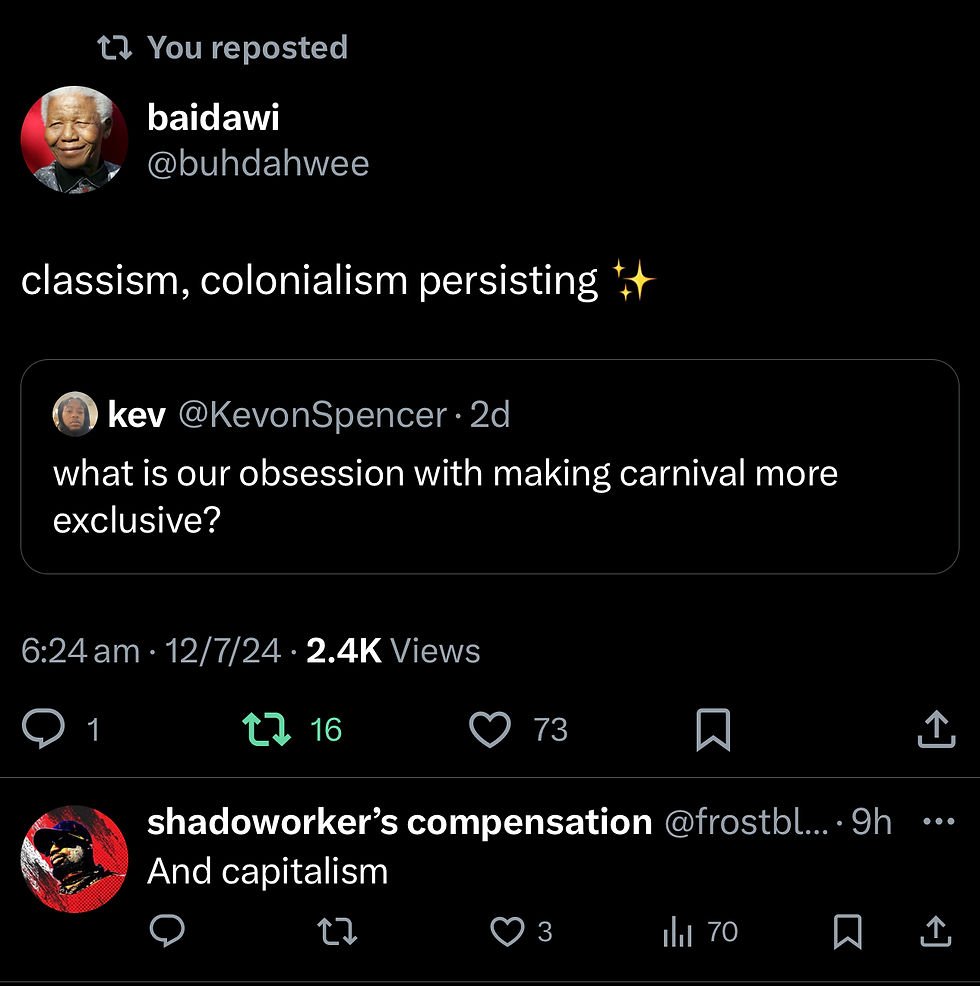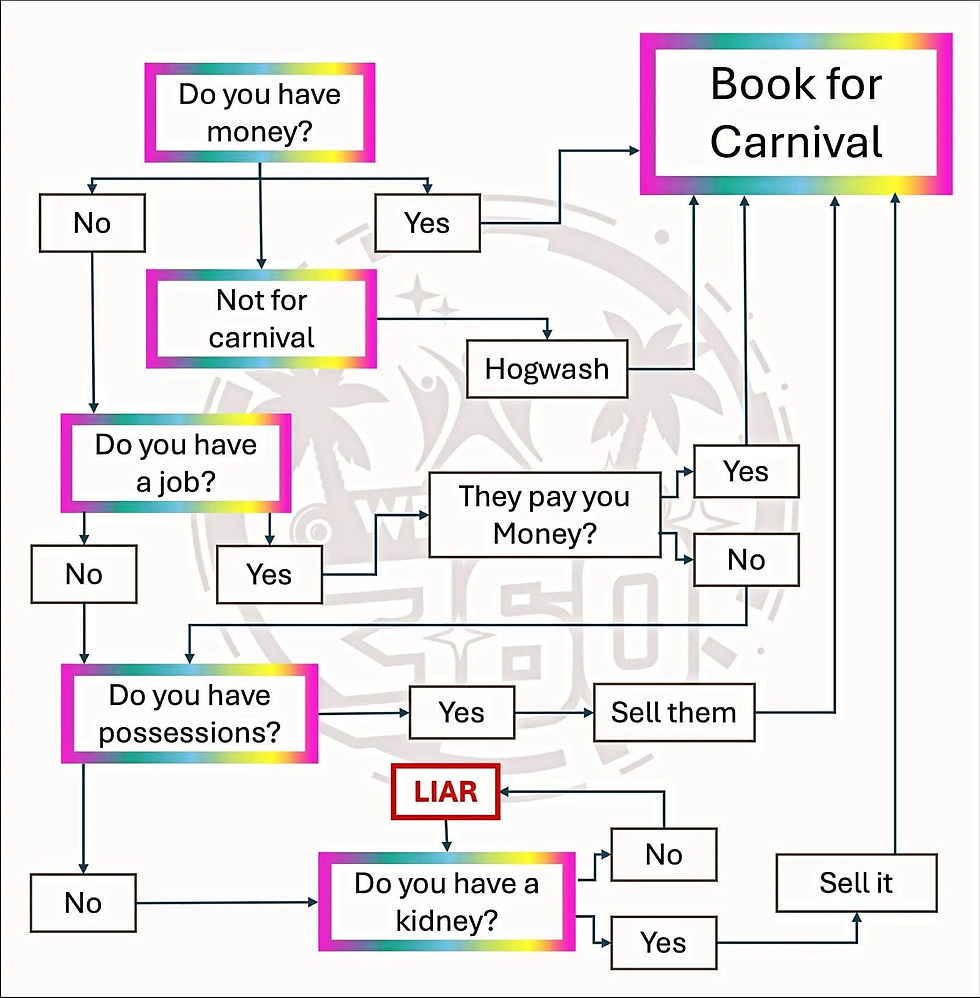Carnival is a Plantation
- dzifajob
- Dec 7, 2024
- 6 min read

Christmas may be 18 days away but Trinidad is already in Carnival mode. Every week tickets go on sale for parties that are not scheduled to take place for another two to three months. Early bird tickets for some all inclusive fetes like QRC’s Fete Royale priced at $1,100 dollars are already sold out.

All of this is happening against a backdrop of stagnant wages, striking port workers, inflation, a forex crisis that has been in the making for years and the general disbelief in some quarters that in a time such as this - that the cabinet would accept a recommendation to increase the wages of senior public servants, including but not exclusive to the politicians sitting in Parliament. Media headlines and Union Leaders tell us that times are increasingly difficult but the traffic on the road, sold out fetes and a cluttered event calendar tell a much different story.
Any student of history can tell you that planation life in former colonies like ours was rife with inequity. Carnival was birthed in resistance but it sometimes feels as if we have spent the past sixty two years trying to recreate the divisions of colonial life. Nowhere is this more apparent than in the two-day street parade known as Carnival Monday and Tuesday and the surrounding 3 month season of feting.
A user on “X” formerly Twitter recently asked “What is our obsession with making carnival more exclusive?”. One response was simply, “classicism, colonialism persisting.” I don’t necessarily disagree because the elements of culture and art, think Canboulay, ole time mas characters and stick fighting have been pushed to the side in favour of a pre-packaged street parade and parties.

Think cooler fetes and themed all-inclusive events where the ‘ton,’ think modern day Bridgerton gathers to see and be seen. People dress to impress, drink to excess and either pretend to have fun or drink just enough to ensure that they do. Not everyone is pretending of course, but I think a great many people are. If they genuinely enjoyed themselves, they wouldn’t complain so much about everything from fete prices to Monday wear prices to the difficulty in finding a makeup artiste, and the need to apply to be a masquerader in certain bands. There is also the new, somewhat uncomfortable reality that when you select a costume you now have to pay separately for the back pack, armbands and head piece that used to be included in the price of the costume.
Every plantation haas a system and we are no different. If you benefit from the system you are unlikely to think that there is anything wrong with it. In my system the die-hard partygoers and masqueraders are the enslaved persons who keep the entire thing running. They spend both their time and their disposable income either playing mas, going to parties or doing both. A subset of these people are culture die hards for whom J’ouvert and mas are spiritual experiences, but for many playing mas and feting is THE thing to do. Sometimes it feels like partying is the ONLY thing to do and peer pressure and FOMO (fear of missing out) is a very real thing. For many, the pull to be seen as part of the ton is too strong to be denied. These are the people that will max out their credit cards, take loans and plan their vacations so they can be like the salt of the earth in every fete. Two a day, if stamina permits and sleep is optional. Just look at the image below.

Many but not all of these persons live on a fixed salary where their disposable income is constrained by factors outside of their control including inflation. For most workers, myself included free time is dictated by the demands of the job. My hours are ostensibly 8-4:30 Monday-Friday with 45 minutes for lunch, but I never take lunch and working beyond 5 and on weekends happens more often than it does not. When Carnival hits and you add in parties, a two day weekend is insufficient time to rest, pursue a hobby, spend time with friends, do laundry, cook, run errands, see about the car or house or any of the other life activities that persons at the lowest end of the plantation hierarchy have to do for themselves.
Then there are the people for whom Carnival is an intense but welcome work period. It is here that they can make the extra money that is needed to help tide them over for the rest of the year. For me these are the indentured persons, seamstresses, street vendors, support staff, taxi drivers, bar tenders and band security whose jobs would not exist in such volume without the festival. Persons in this category were hardest hit during the pandemic. The work is hard and their hours are long but this is their season to make as much as they can. Life is expensive and they don’t have the luxury of choosing whether to fete or to rest. They have to work so the choice for them is pre-determined.
The persons at the very top of the hierarchy much like the overseers and landowners sixty plus years ago are the individuals and groups who now control the culture, and have shaped the festival into something that ultimately serves them. They own bands, throw parties and run businesses that allow them to make their entire working profit for the year in three-four months. The persons in this select group come from every creed and race, but collectively they earn more money than they spend during this period. Their lives don’t revolve around 40-50 hour work weeks and 14 vacation days a year. Going to parties over the next three months will not cost them any money or nearly as much money as persons in the other two groups. These are the people with links, comps and access. There is inequity within this group too but generally they are better off than everyone else on the planation.
Carnival feels packaged towards persons who live and work abroad. Yet still there is a growing recognition from people at the top of the pyramid that we have started to price ourselves out as a carnival destination. Earlier this year a representative of Yuma told a Guardian reporter that "Our Carnival is certainly very expensive, when it comes to accommodation, flights and transportation.” It is no surprise then that most of these persons also have a presence in regional and international carnival events. That is just good business.
As a national who is resident in Trinidad & Tobago, ticket prices and the increasing need to purchase them months in advance has started making Carnival feel prohibitive, for me anyway. The challenge for every individual regardless of their place in this capitalistic system is to make choices that align with larger goals, and that are in service of personal happiness and fulfilment. Personally, I am trying to plan how to use my 14 vacation days and make deposits for trips in Q1 of next year.
Having lived abroad for over a decade I party to see my friends, especially those who make the annual trip home for Carnival. I also think that there is a special vibe in giving a man a sweet wine while slight high and watching the sun rise. There are bonus points if there’s a cigar involved and adult activities post fete. The reality remains however that there is an opportunity cost for every decision.
As another Carnival season descends upon us I find myself asking what benefit will I get from spending time and money partying. I want to see my friends and I wanna like myself with somebody son in a fete; but not if it means denying myself adequate rest or the monetary resources to do the other things that bring me joy. If mas and fetes are really your thing - spend the money. Play the mas! Do it because there’s nothing else and nowhere else you’d rather be! Consider not doing it, or engaging in less of it, if your primary reason is to fit in because Carnival is something we have been conditioned to enjoy, or if participating requires that you go into debt or defer a dream. "IS WE TING!" may be true but it's also just really great marketing.







Comments